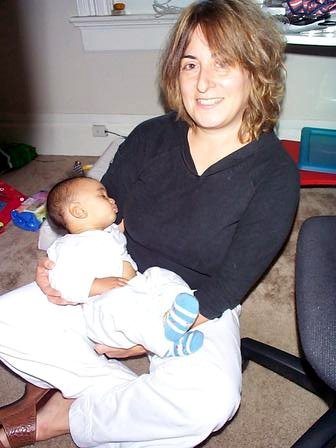Walk (Kayuputih, 1996)
Luh's doctor told her she needed daging (meat) removed from her uterus, she is telling me as she bends and empties a bowl of yesterday's rice onto the ground to feed the black pigs.
Sakit, she says, grimacing, holding her belly and bending forward, then backward again.
A sow and two of her piglets rush towards the rice and snuffle through it with their snouts.
Luh has bad cramps every month when her blood comes. And perhaps if the fibroids are removed she can have another child.
Yudi, her son, comes out of the house with a black helmet on.
But the operation is expensive, Luh says, scooping up a basket on the porch and balancing it on her head.
Without saying a word, Yudi roars off on the Honda Astrea in a cloud of dust, scattering chicks.
Ayo, says Luh, tilting her head up the hill. Jalan.
In Indonesian jalan means road or go, and jalan jalan means to walk. The division between the noun "road" and the verb "go" and the person walking is not clear. The road and the walker and the act of going are all aspects of the same thing. The road, the first step, the journey, what you become. What the road makes you, and how you transform the road.
We are on the road, walking, and two neighborhood children wearing oversized t-shirts and no shoes merrily follow us. I can see the blue of the Java Sea down far below. In the field by the side of the road, the tobacco leaves are curly green. In the lower terrace, villagers winnow rice in rattan trays. Beli Kuasa says the land on the other side is a good deal if I want to buy it.
We walk past the lovely little girl standing in her doorway wrapped almost to her armpits in a tight sarong. She still gets fifty dollars per month from the Dutch anthropologist who was in Bali last year interviewing her ibu about single mothers in Bali. The girl is adorable but her mother looks tired.
We wave to the mother. The little girl just stares.
We walk and walk, and then we are at the market stall that Pasek's cousin Mbok Made operates. She has a wide grin with a couple missing teeth and a merriness to her eyes as if selling wilting vegetables all day in a hot dusty stall up in the hills of Kayuputih were a joy, and it is.
We point to the tempe and the black undis beans. Mbok begins slowly wrapping those in banana leaves, as we add eggs to our basket. I hand over ten thousand rupiah, and Mbok hands back a few hundred in coins. Then she adds some limp kangkung and a plastic bag filled with coconut oil in our basket for nothing, because I am part of the family.
I add several more eggs to make sure we have enough if the neighborhood kids join us.
Sakit, she says, grimacing, holding her belly and bending forward, then backward again.
A sow and two of her piglets rush towards the rice and snuffle through it with their snouts.
Luh has bad cramps every month when her blood comes. And perhaps if the fibroids are removed she can have another child.
Yudi, her son, comes out of the house with a black helmet on.
But the operation is expensive, Luh says, scooping up a basket on the porch and balancing it on her head.
Without saying a word, Yudi roars off on the Honda Astrea in a cloud of dust, scattering chicks.
Ayo, says Luh, tilting her head up the hill. Jalan.
In Indonesian jalan means road or go, and jalan jalan means to walk. The division between the noun "road" and the verb "go" and the person walking is not clear. The road and the walker and the act of going are all aspects of the same thing. The road, the first step, the journey, what you become. What the road makes you, and how you transform the road.
We are on the road, walking, and two neighborhood children wearing oversized t-shirts and no shoes merrily follow us. I can see the blue of the Java Sea down far below. In the field by the side of the road, the tobacco leaves are curly green. In the lower terrace, villagers winnow rice in rattan trays. Beli Kuasa says the land on the other side is a good deal if I want to buy it.
We walk past the lovely little girl standing in her doorway wrapped almost to her armpits in a tight sarong. She still gets fifty dollars per month from the Dutch anthropologist who was in Bali last year interviewing her ibu about single mothers in Bali. The girl is adorable but her mother looks tired.
We wave to the mother. The little girl just stares.
We walk and walk, and then we are at the market stall that Pasek's cousin Mbok Made operates. She has a wide grin with a couple missing teeth and a merriness to her eyes as if selling wilting vegetables all day in a hot dusty stall up in the hills of Kayuputih were a joy, and it is.
We point to the tempe and the black undis beans. Mbok begins slowly wrapping those in banana leaves, as we add eggs to our basket. I hand over ten thousand rupiah, and Mbok hands back a few hundred in coins. Then she adds some limp kangkung and a plastic bag filled with coconut oil in our basket for nothing, because I am part of the family.
I add several more eggs to make sure we have enough if the neighborhood kids join us.


0 Comments:
Post a Comment
<< Home